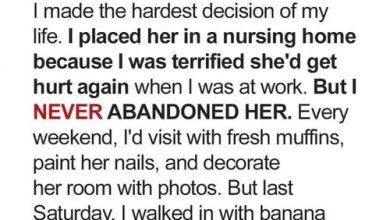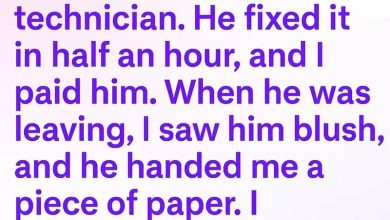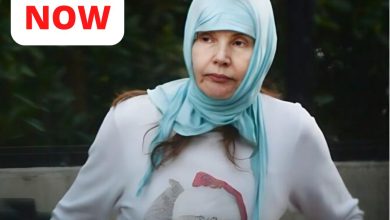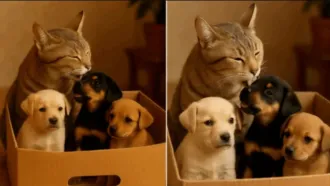Grandma’s Last Gift
The night my aunt handed me Grandma’s note, I read it until the words blurred. Her handwriting trembled, but her message didn’t:
“Your parents will try to take this from you. Don’t let them. You’ve always been the one who needed a chance. Take it.”
It felt like a hug and a warning. I cried like a child on the twin bed in the apartment I’d finally managed to rent.
I wasn’t the golden child. My parents were loud—opinions, expectations, ultimatums. My brother had charm that turned mistakes into second chances. I was quiet. A pile of student debt, a breakup that drained my savings, a job that chipped away at me daily. But Grandma saw me. Her inheritance wasn’t extravagant, but it cleared my credit cards, paid off my car, and gave me something I’d never had: breathing room. And belief.
When I refused to sign the papers—money for my brother’s startup, a chunk to ease my parents’ mortgage—they stopped talking to me. My mom texted, “You’ve changed.”
I replied, “Maybe I finally got honest.”
She never answered. The silence stung, then settled into something like peace.
I left the marketing job that hollowed me out and started working part-time at a bookstore downtown. It didn’t pay much, but it gave me back my breath. At night, I wrote. I’d been scribbling stories since middle school, but never thought they mattered. Grandma did.
“You’ve got a voice, honey,” she’d say, catching loose pages on her kitchen counter.
“Don’t let the world silence it.”
So I posted a few pieces online under a fake name, expecting nothing. But the void didn’t swallow them. Comments trickled in. A small community formed—people who said my words made them feel less alone. I kept it secret. Then I met Liana at the shop. She listened more than she spoke, remembered tiny details, and made my heart skip like a record hitting the right groove. One evening, walking home through crunchy leaves, I told her about the inheritance.
“She must’ve really seen you,” she said. I nodded. For once, I didn’t cry.
Liana became the second person to read my work. She curled up on my couch with printed pages and a pen, marking the margins:
“This line lands.”
“Say the thing you’re avoiding.”
“You have something to say.”
And when she said it, I believed her.
Six months later, I self-published a small collection. It didn’t go viral, but it reached the right eyes. An editor emailed: “Ever thought about writing a novel?”
I stared at the subject line until it blurred, then forwarded it to my aunt:
“She was right.”
My aunt replied:
“She always was.”
The first draft was chaos. The second, painful. By the third, I felt like I was bleeding truth. It was fiction, technically, but every page held a piece of Grandma and the versions of myself I’d buried. A year later, the book came out. No billboards, no launch party—just enough buzz to feel real. A podcast invite. A morning show. A librarian wrote to say a teenager in her town felt seen because of my story. That moment mattered most. Someone was listening.
Then my brother walked into the bookstore. No warning—just a tailored coat and that familiar grin. I nearly dropped a box of bookmarks.
“Hey, sis,” he said, like we hadn’t gone silent for months.
I braced for the pitch.
“To talk,” he said.
“I read your book.”
He said he cried.
We sat on the bench outside the coffee shop. He told me the business failed, he’d moved back in, and our parents were furious—for “letting me get away with the money.”
“I didn’t let you do anything,” he said.
“You did the right thing. I didn’t see it until now.”
It wasn’t an apology, not exactly. But it was a crack in the wall.
I told him about Grandma’s note. He stared at the street.
“She loved you differently,” he said.
“I thought it wasn’t fair. Maybe she saw what we didn’t.”
The book did better than expected. I spoke at two universities. My agent—still strange to say—called one morning: a film company wanted to option the rights. I stood in my kitchen, toast forgotten, and whispered,
“Thank you, Grandma,” to the quiet.
Then another letter arrived. No return address. Inside was Grandma’s original will—not the version my parents had waved around. This one left me everything: the house, the land, the paintings, the cash. Tucked inside was one line:
“If they try to change the story, tell your own.”
Turns out, my parents had forged a version and tried to push it through. But Grandma, ever precise, had mailed the real one to a lawyer in another state and instructed him to send it to me a year after her death.
I could’ve gone public. Could’ve pressed charges. Instead, I mailed them a copy with a note:
“I know.”
They never replied.
My aunt called.
“Your grandma knew exactly what she was doing.”
I kept the house. Small, with creaky floors and a garden gone wild. It felt like it had been waiting for me. Liana and I moved in that spring. She planted sunflowers. I painted the walls. We filled it with secondhand furniture and first-rate joy. We hosted dinners, game nights, little writing workshops at the kitchen table. The neighbors started calling it “the story house.”
Sometimes I still hear Grandma’s voice, soft and steady:
“You’ve got something to say, honey. Say it.”
So I do.
My brother visits sometimes. We sit on the porch steps with iced tea and careful conversation. We don’t rewrite the past. We choose peace. My parents remain silent. I set the boundaries I should’ve set years ago and let the ache be what it is.
If there’s a lesson, it’s this:
People close to you might not believe in your voice. They might try to rewrite your story to suit their own. But you get to decide whose script you carry. And if you’re lucky, someone—maybe a grandmother, maybe a friend—will hand you permission when you can’t find your own. Not because of money or fame, but because you kept going when everything said stop.
So here’s to the quiet ones. The overlooked. The trembling hands with loud hearts.
Your story matters.
Keep telling it.




